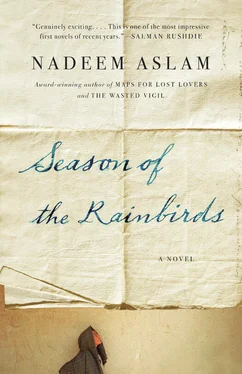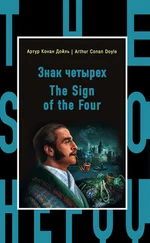Zébun stood motionless, shocked. Then she too turned off the heat under her pan. ‘What’s the matter, Alice?’ Zébun remembered that something similar had happened a few years back when Alice had just begun to menstruate. The terrified girl had wept inconsolably, thinking she was going to die. Zébun had had to explain to her the changes taking place inside her twelve-year-old body. On that occasion Zébun had instantly guessed the cause of Alice’s fear. And she had begun saving cloth for her — old towels, scraps and cuttings of dress material. Now she folded her arms and tried to think.
Alice turned her head from side to side — ‘Nothing.’ She shook her head again and tucked behind her ear a lock of hair that had escaped the pin. But then she placed both hands over her face and began to sob again, violently.
‘Has brother-ji said anything?’
Alice dried her cheeks, blew her nose on her stole and swallowed hard. ‘It’s my father.’
The wrinkles on Zébun’s forehead became pronounced. ‘Is he unwell?’
Alice stared at the wall in front of her. ‘No,’ she managed to say before her eyes filled with tears once again. A droplet hung at the tip of her nose.
Zébun lost her temper. ‘What then?’
Alice spoke with one hand still covering her face, as though she wished to hide it. ‘I heard him talking to my mother. I was in the next room.’
A simple idea came to Zébun. She nodded and smiled. ‘Are they looking for a suitable young man for you?’ she asked and said, ‘Well, Alice, all we women have one day to—’
‘It’s not that,’ Alice interrupted softly. She inhaled rapidly through her mouth and tried to steady her breathing. ‘I was in the next room and I heard my father say to my mother that she had given birth to an ugly daughter. He said every time he looks at me he wonders what kind of djinn or bhoot I am. And I heard him spit in the corner of the room.’
Zébun let herself watch the floor, silent as she tried to grasp what Alice was saying.
‘And he did mention marriage. He said he wonders how he’ll ever get rid of me. He said we’re so poor we can’t even tempt anybody with a large dowry.’
She leaned towards Zébun, perhaps asking to be held. But Zébun did not move.
A few minutes passed before Alice stopped her swaying and uncovered her face. Her eyes were red and her mouth was smudged. Wet from her tears was trapped in tiny films under the curving hairs of her face. She lit the fire under the meat. Zébun took a step back to allow her to light the second burner with the same matchstick. Their eyes did not meet.
Zébun said, ‘Wipe your eyes, girl. Brother-ji is home, he might come in.’

‘All we need to do is to appoint a new watchman, that’s all.’
Mujeeb Ali opened the cupboard and, from the section neatly stacked with documents, he took out a file. ‘It will take you a long time to understand how things are done in this place, Azhar.’
Azhar, seated behind the desk, took the fountain pen out of his pocket and unscrewed the cap. Mujeeb Ali brought the file over to the desk and placed it unopened before him. ‘How was Gul-kalam chosen?’ Azhar asked.
Mujeeb Ali took the empty chair across the desk. ‘No one remembers. He used to supply firewood to people’s houses and sometimes milk the cows. Over the years he became the nightwatchman and brought his family down from the mountains. His brother began painting houses. Just one of those things.’
Azhar opened the file and, without reading, scrawled his signature at the bottom of the page. He lifted the corner of the first sheet and signed the next page. ‘It shouldn’t be your exclusive decision as to who guards the town at night,’ he said without raising his eyes from the papers. ‘Who are these people anyway? I’m not sure I feel comfortable with the idea of four armed men roaming the streets at night.’ His voice was courteous, but strained.
Mujeeb Ali listened patiently, unblinking. ‘It’s not just my men. There were two policemen with them last night, as there will be tonight.’
Since it was Tuesday Azhar had spent the afternoon at the courthouse hearing criminal cases brought by the magistrate. It was the only time of the week when he was sure to be in town. A deputy commissioner had to preside over the weekly sessions court in every town under his command: so even if Azhar had lived elsewhere he would have had to journey to this town once a week. Otherwise Azhar kept erratic hours, arrived and left whenever he wished. So every Tuesday there was a barrage of people congesting the arches outside the courthouse, as they waited to see him: there were those who needed passports and identity cards for departures to the Arab countries; others offering bribes to secure a favourable outcome of cases; fathers of unemployed sons, mothers of nubile daughters; sharecroppers needing loans to buy oxen. For the rest of the week these people would leave messages and gifts outside his house — baskets of fruit and vegetables, sides of meat, embroidery and lace, cakes of white perfumed soap, cages of songbirds. Once there was a fighting cock with a plucked neck and a tiny canvas muzzle over its beak, and once, even more surprising, there was a large bouquet of flowers. In the beginning Azhar used to send these things to the mosques but then it began to seem easier just to drag them over the threshold. People also approached him through Mujeeb Ali.
Tired and hungry he closed the file and looked Mujeeb Ali straight in the eye. ‘And I would like your men out of the post office.’ The noises of the heaving river outside the house and the heat were making it difficult for him to breathe.
A curt smile came to Mujeeb Ali’s lips.
Azhar spoke again: ‘If anything needed to be done I would have authorised it. Any order would have gone from me to the superintendent of police and from him to the police inspector. He should have carried it out.’
Mujeeb Ali picked up the file. ‘So,’ he said, ‘you don’t approve of what I did?’
‘No.’ Azhar returned the pen to his pocket. ‘You are just a citizen. It was outside your jurisdiction.’ Then immediately, as though it only needed mentioning — was not to be lingered on, not to be stressed by allowing a silence to mount up — he lowered his voice and said, ‘You must try to understand my position. The town is without a post office now. I have divisional superiors to report back to. And since the suspension of the Constitution I am also answerable to the provincial martial-law administrator.’
Mujeeb Ali laughed indulgently. ‘Is that what bothers you?’ Expression had returned to his face. ‘Your divisional superior, as you so respectfully address him, and my brother Nadir used to play marbles outside this very house. Nothing has really changed since then except that now they play polo on the General’s private grounds.’
The words came out in a shout. ‘That is not the point.’
‘Calm yourself, Azhar. You were not here and the matter had to be dealt with urgently.’
‘Urgently? There is nothing here that needs to be taken the least bit seriously.’ Azhar had stood up, straining forwards, his palms splayed on the desktop.
Raindrops hurled themselves against the glass of the window. From the quality of the light Azhar sensed that it was past five o’clock. He walked around the desk. ‘I have to go now,’ he said lightly.
Mujeeb Ali’s eyes followed him unseeingly to the door. ‘I’ll have the post office keys sent to the barracks.’
Azhar turned at the door and showed him his empty palms. ‘You have to understand my position.’
The weather showed no signs of lifting. Smoky, silver-edged clouds piled up above the house. Plants thrashed in the gale and the rainwater corkscrewed down from the eaves and clapped on the edge of the parquet veranda. Arshad Ali was on the veranda with his niece when Mujeeb Ali emerged from the door behind them. Uncle and niece appeared to be discussing the parrot hanging above their heads. Arshad Ali pointed at the bird through the parallel bars at the base of the cage. ‘Does it talk?’
Читать дальше













